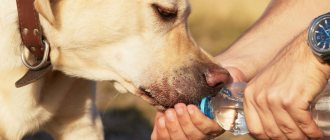Dangerous and not so symptoms of apathy in a dog. The first signs of how to treat and prevent apathy.
It is common for a person to wake up sleep deprived after a hard day at work or a night at the club. This condition is rare for animals. They don't get up with a broken head. If a usually active and cheerful dog does not get up all day and does not want to go outside for a walk, then you should worry about its health.
Apathy is a state when a dog does not want to play, eat, or walk. She wants to be left alone. This condition can be caused by various reasons. Many are not dangerous to health, but there are exceptions.
What is lethargy in dogs?
Lethargy (depression) means lethargy, drowsiness, or lethargy.
A lethargic dog may not be interested in going for a walk, even if it is unusual for him, or he may not want to eat or play. Sometimes depression in dogs can be caused by changes in the weather, perhaps being very hot or tired after a very long walk. But it could also be the first sign that something is wrong with your dog.
Lethargy, weakness and sudden fatigue are common signs of a huge number of illnesses in dogs, but these symptoms themselves are quite vague and subjective - many different problems can make your dog lethargic and weak.
How to get your appetite back
If your dog has no appetite and no health problems, try following these tips:
- Put away food and bowls, skip a few meals
and don’t give in to begging for treats. All dogs have primary instincts, and this will not allow the body to starve. Once your pet is hungry enough, he will agree to eat food from his bowl.
- Do not leave food in the bowl after your dog has eaten.
Clean up any leftovers before the next feeding time.
- If the dog does not have gastrointestinal problems, allergies, give a lightly salted piece of fish or meat 15–20 minutes before feeding
. Salt will increase the feeling of hunger. But don’t get carried away - this is one-time advice; it is not recommended to do this on an ongoing basis.
- Walk your dog more and play.
This will allow her not to get bored and burn calories.
- Create competition
Offer food to another pet in front of a picky pet. Dogs are greedy and don’t like to share food, toys or the owner’s attention, so they will immediately show interest in what they gave to a competitor.
- Change your diet.
Sometimes it is necessary to change the brand or flavor of food, or add a new type of porridge to stimulate the dog's appetite.
What should I do if my dog is lethargic?
If your dog is older or older, he may gradually become more lethargic as he ages. Lethargy may be due to osteoarthritis or other age-related conditions that cause pain or exercise intolerance.
If your dog is younger but suddenly begins to appear weak, lethargic, and lethargic, there may be a more serious problem. This is especially true if it is accompanied by a refusal to eat or drink. In any case, you should contact your veterinarian for advice or, if they don't have time and you feel it is an emergency, take your pet to your nearest veterinary clinic or 24-hour hospital immediately.
What to tell your veterinarian at your appointment
The cat is lethargic, sleeps all the time and eats little: what to do
When visiting a specialist, the owner must describe in detail all the clinical signs observed at home and the time of their appearance. It is important to talk about the events that preceded the change in the pet’s well-being (increased activity, eating garbage on the street, close acquaintance with stray animals, etc.). A preliminary diagnosis is made from the words of the owner, and the final diagnosis is made after laboratory and instrumental diagnostics.
There are a large number of factors that cause unusual behavior in pets. If it is impossible to determine the source of the disorder on your own, then you need to stop self-medicating and seek help from the nearest veterinary clinic.
Why does my dog seem lethargic?
There are several reasons why your dog may appear tired and lethargic.
The most common causes of lethargy in dogs are:
- Infections including parvovirus, distemper, kennel cough and leptospirosis
- Metabolic diseases - obesity, dystrophy
- Heart problems
- Liver problems
- Diabetes mellitus and, conversely, hypoglycemia
- Medicines for fleas or worms
- Use of antidepressants
- Anemia, which is often caused by parasites such as fleas or intestinal parasites
- Food poisoning such as garlic and onions
- Pain, trauma, diarrhea, hypothyroidism, tumors
- Absolutely any disease
Lethargy as a sign of illness
There is no cause for concern if the dog is sad and lethargic for a short time, say, due to fatigue, but its appetite and stool are normal. But if, in addition to lethargy, there are other alarming symptoms, then you need to quickly arrange an appointment with a veterinarian. The most common causes of weakness in animals are:
- Pain
[2]. If the animal is not only inactive, but also tucks its tail and trembles, does not allow its owner to touch itself and growls, one may suspect that it is in pain. And there are plenty of reasons for this: wounds from bites and burns, various diseases of internal organs, parasitic infestations, and so on; - Stress
[1] is another reason why a dog is lethargic and indifferent to everything that interested him before. Moreover, periods of apathy can be replaced by strong excitement, when the animal constantly barks, howls, ignores the owner’s commands, and may even growl. Under stress, there are often cases of damage to the owner’s things, marks and piles may appear in the wrong places, a perversion of appetite, aimless wandering around the house; - Poisoning
[2]. Lethargy in a dog can be caused by eating spoiled or poisoned food, inhaling toxic fumes, the penetration of snake or spider venom into the body, or taking certain medications. At first, the poisoned animal is worried, but gradually weakens, its breathing becomes noisy, vomiting or diarrhea may be present, the temperature drops or rises, saliva runs from the mouth, convulsions occur, the mucous membranes change their usual shade (turn pale, blue or red). The animal may lose consciousness; - Infectious diseases
[2]. Almost always, a dog does not eat and is lethargic when there is a viral (adenovirus type 1 and 2, canine distemper, etc.), bacterial (leptospirosis, salmonellosis, borreliosis, clostridiosis, etc.) or fungal (dermatophytosis) infection of the body. There are many symptoms of the listed diseases, they vary depending on the type of pathogen that provoked the disease. But whenever there is an infection, the dog refuses to eat and play; - Oral diseases
. The dog is lethargic and does not drink (or drinks, but very little), and also refuses food if it has one of the following diseases: stomatitis, gingivitis, periodontal disease. With such ailments, the animal’s gums are swollen and red, an unpleasant odor emanates from the mouth, saliva runs (with or without blood), the fur in the neck area is constantly wet, there may be ulcers on the oral mucosa, and plaque on the tongue; - Oncology
[1]. The development of a malignant tumor almost always causes the animal to become lethargic and constantly sleep. The pet's weight decreases, the fur becomes dull and falls out easily. Sometimes, with cancer in the later stages, the animal whines pitifully; - Diseases of the digestive system
[1]. With gastritis, stomach ulcers, colitis, enteritis, the pet always looks weak, lethargic, eats little, there may be fever, diarrhea (blood or mucus may be present in the stool, feces are smelly), nausea and vomiting, rumbling in the stomach, flatulence. And if there are problems with the liver (hepatitis, fatty hepatosis, etc.), the pet refuses to eat, stops enjoying walks and games, feels nauseous, sometimes vomits, the mucous membranes may turn yellow (the whites of the eyes also become yellow), the dog drinks a lot, the urine becomes dark , the color of feces often changes (from light yellow to greenish), lethargy develops, weight gradually falls; - Diseases of the heart and blood vessels
[2]. With such ailments as, for example, hypertension, myocarditis and ischemia, the dog lies apathetically most of the time due to pain in the sternum, may cough and breathe hoarsely, suffer from shortness of breath, and pulse fluctuations. The mucous membranes turn pale, the limbs often swell, and the animal sometimes feels sick; - Diseases of the musculoskeletal system
. With osteoporosis, arthritis, osteochondrosis and joint dysplasia in dogs, the hind legs give way, lameness of varying degrees appears on the thoracic or pelvic limbs, clumsiness when moving, the animals are apathetic, do not run and walk little (severe pain can even completely immobilize the pet), and their weight grows; - Endocrine diseases
, the most common of which are diabetes mellitus, hypothyroidism and Cushing's syndrome. With such ailments, the dog is weak, drinks a lot and urinates often, eats heavily, but, as a rule, loses weight. With Cushing's syndrome, your pet's abdomen increases in volume. Due to endocrine problems, the fur becomes dull and thin, the skin itches, becomes thinner, and becomes covered with wounds that take a very long time to heal. Dry mouth. There may be problems with carrying a pregnancy, some bitches have a disrupted estrus schedule; - Worms
. Lethargy, fluctuations in appetite (some dogs eat a lot, others refuse food), upset stomach and intestines can be signs that parasites are living in the dog’s body. Other signs of helminthic infestations include cough, deterioration of hair (dullness, disheveledness) and skin (loss of elasticity, dandruff), bad breath, the appearance of mucus and blood in the stool (eggs, worm larvae and even adult worms can be found in the stool) , itching of the anus (the dog rolls on its butt on the floor, bites itself in the anus); - Allergy
. Sneezing, mucus discharge from the nostrils, tearing and redness of the eyes can be due to an allergic reaction to, say, food components, medications, shampoos, flea saliva, dust, mold, pollen. Other allergy symptoms include severe itching of the body (the dog is constantly itching), swelling of various parts of the body, peeling and wounds on the skin from scratches and bites, noisy breathing, decreased appetite and weakness; - Anemia
[2]. Does the dog constantly sleep and even in rare moments of wakefulness looks tired and apathetic? Perhaps the whole point is the development of anemia - a lack of hemoglobin and red blood cells in the blood. With this disease, animals eat little, the dogs' gums are pale. Blood pressure drops and the pulse is high; dizziness is often present, as a result of which the animal walks staggering; - Kidney diseases
[2] (urolithiasis, renal failure, pyelonephritis, glomerulonephritis, etc.). If the pet is lethargic and does not drink water, or drinks more than usual, suffers from swelling and frequent painful urination, it can be assumed that its excretory system is not in order. The main signs of kidney problems include changes in the amount, smell and color of urine (urine comes out less or more than usual, it smells strong and may be bloody), vomiting, pain in the lower back (the dog spends a long time looking for a comfortable position to sleep, complaining whines).
Could guilt or obesity cause lethargy in dogs?
One of the main causes of exercise intolerance and lethargy in dogs
- is obesity. Dogs that are overweight are at greater risk of heart disease, cancer and diabetes, as well as debilitating conditions including arthritis.
Obesity is a serious impediment to your pet's well-being. However, all is not lost if you are concerned about your pet. Many veterinary day practices will provide free weight checks and advice on diet and exercise.
Puppies need plenty of rest. On average they will sleep 15-20 hours a day and this is very important for their healthy development. But during waking hours, puppies should be full of energy. If you have a puppy that is constantly tired and lethargic, you should contact your veterinarian immediately as this is almost certainly a sign of some kind of medical condition. Lethargy is a symptom of a wide range of illnesses that can occur in puppies, including parvovirus, pneumonia, anemia, fever, congenital heart defects and malnutrition.
Infection
Any infection, including serious ones like parvovirus, distemper, kennel cough, leptospirosis and heartworm, can make your dog lethargic.
Parvovirus is spread through feces. Symptoms of parvovanism may include lethargy, vomiting, diarrhea and abdominal pain. Treatment for parvovirus includes aggressive supportive care with fluids, anti-nausea medications, and antibiotics.
Distemper can cause symptoms such as fever, lethargy, discharge from the eyes and nose, and cough. This can cause neurological problems. Signs of distemper are extensive and vary from dog to dog. Treatment may include antibiotics, fluids, and anticonvulsants.
Kennel cough is a contagious respiratory disease. Its most characteristic symptom is a dry signal cough. Dogs with kennel cough may be lethargic and febrile. Treatment may include cough suppressants, antibiotics, and bronchodilators.
Heartworm disease is caused by heartworms, which are transmitted through mosquito bites. Heartworm symptoms may include lethargy, depression, fever and weakness.
Prevention with oral or injected medications is the best option. Treatment of existing disease requires a series of injections and medications, as well as months of strict cellular rest.
Treatment of lethargy in dogs
If you have a depressed dog with signs of lethargy that is not typical of his temperament, you should see a veterinarian.
Doctors at the clinic will most likely perform a thorough clinical examination, as well as ask questions about your dog's recent behavior and past veterinary care, and collect a medical history. The doctor will draw up a list of differential diagnoses based on your medical history and clinical picture. In most cases, diagnostic tests such as blood, urine, and stool tests will be performed to rule out or confirm the likely illness that is causing the depression symptom. Your veterinarian may also perform an X-ray, an ultrasound scan, and an electrocardiogram to check for heart problems.
When to contact a veterinarian
If your pet has other signs besides drowsiness - vomiting, diarrhea, fever, the animal may tremble, and these symptoms persist for more than 2 days, you should immediately contact a veterinarian.
Lethargy in a pet and ignoring its favorite food is a reason to be wary. You should contact a veterinarian if the animal has a number of other signs indicating the presence of pathological processes, or if lethargy does not go away within several days.
Depression in dogs
Just like people, dogs can suffer from mental health problems such as depression. Depression in dogs is usually caused by major changes in their environment and behavior, such as the loss of their owner or another pet, a child or partner, moving, moving into their home, or indeed, you and your dog moving to a new home. Chronic boredom can also lead to depression in dogs, as well as dermatological problems such as paw licking syndrome.
Signs of depression in dogs may include a less playful mood, less interaction with other dogs, lack of appetite, a less sociable personality, and chewing or licking of paws. Fortunately, as long as they are given plenty of love, care and attention, most dogs will survive depression within a week or two.
^Top
Medicines
A wide range of medications for dogs can make your pet lethargic or weak. If you notice weakness after starting a new flea or heartworm medication, call your veterinarian immediately.
Many human medications, such as ibuprofen, are toxic to pets. They can lead to weakness, lethargy and even death. Therefore, always keep human medications out of your pet's reach.
If you drop a pill, pick it up immediately - before your dog does. Also, rest assured that any medications you throw in the trash won't reach your dog.
What actions to take
With the above-mentioned symptoms, it is impossible to provide independent treatment for the animal, since it is necessary to take a blood test to identify the presence (or absence) of internal inflammatory processes in the animal. If there is pain in the paws and spine, an x-ray must be taken immediately. The obvious presence of bloody impurities in a dog’s urine is an abnormal phenomenon, and drinking too much is a consequence of dehydration from bowel disorders. We consider it mandatory advice to take your pet to the veterinarian as soon as possible for emergency care.
Causes
Paw failure in dogs can occur for several reasons. Here are some of them:
Direct damage to the limb: this can be an injury, an unsuccessful movement, especially in dogs of small breeds and those that are genetically predisposed to this type of damage, a collision with a vehicle or a fight with another animal. The cause can also be: fracture, sprain and damage to tendons, nerve damage.
- Diseases of the musculoskeletal system: spondylosis, osteoarthritis of the hip joints, intervertebral hernias, osteochondrosis.
- Diseases of the nervous system: damage to peripheral nerves.
- Tumors. Sometimes tumors of soft tissues or neighboring organs can compress nerve pathways, or mechanically impede movement. Also, pain due to tumors can limit movement.
- Genetic disorders. Some breeds of dogs, during selection, were left with those features that provide them with a greater load on the hip joints compared to other breeds, which in turn leads to the development of diseases.
- Some infectious diseases. Some viral diseases cause damage to the nervous system, which in turn can cause problems with movement.
- Puppies with rickets or congenital diseases may also have problems standing up
- Pregnant dogs may fall on their feet late in pregnancy when there are many or large puppies.
- Old age and subsequent degenerative disorders of the musculoskeletal system











